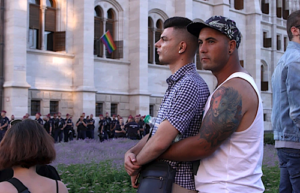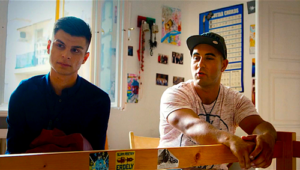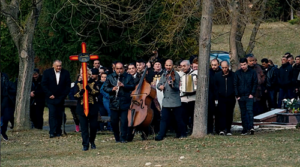By Robert St. Martin
Westwood, UCLA (The Hollywood Times) 05/07/2024
Most of us know very little of Romani gypsy culture which forms a significant aspect of the cultures of Eastern Europe including Hungary, Romania, and Slovakia. We know even less about how Romani men who are gay manage to survive in a hugely homophobic culture where the strong masculine mentality subjugates, dominates, and rejects everything that is out of the norm. That is why a documentary film from Hungary about a gay male couple is both insightful and moving. Narrow Path to Happiness is a documentary made by Kata Oláh that shows the daily life of a couple of Romani men from Hungary that reveals their identities as real people.
Included in the 19th Annual SEEfest Film Festival, Narrow Path to Happiness screened at the James Bridges Auditorium at UCLA on Sunday, May 5. It is a film that deserves more visibility and I hope that Frameline and Outfest will consider the film in their programming.

In the town of Salgótarján near the eastern border of Hungary with Serbia live Gergo and Lenard, two Romani gypsy men who have been together as a couple for 6 years. They hope to unleash their creativity by making a musical about their lives together and about their identities. To do this, they move to Budapest where they believe they have more opportunities to realize their dream. A dream that will take them on opposing paths where their own identities cross them with the crucial moment that their country of Hungary is currently experiencing against them with the wave of anti-LGBTQ sentiment encouraged by right-wing politicians. A narrow, dangerous, pointed path to the happiness they seek: Hence, a “Narrow path to happiness.”
That path that passes through the identity concretization of being a Romani gypsy and homosexual in families where the strong masculine mentality dominates. Even Gergo and Lenard have internalized that mentality, mainly due to the force of religion, due to social group pressure, due to the current moment in their country against the LGTBIQA+ community and the racism suffered by Romani people in Hungary.

Gergo and Lenard are very intelligent and talented young men, and we quickly see how they are savvy with music, social media, and social interaction. They refuse to let being Romani gypsy and gay get in the way of their big plans in life. Gergo struggled hugely with the intolerance of his mother who kicked him out of the household when she discovered his sexual identity issues. He is quite masculine and works in construction in Budapest to make a living, although he is also a gifted singer and songwriter. His life begins to change with the death of his mother, and he then attempts to make peace with his widowed father. On the other hand, Lenard has a charming mother who is Romani but understands him and has always been supportive of him regardless of his preference for a male partner.

Their dream of making a film that is also a musical is their motivation. Gergo with his songwriting and singing talent is already writing, performing and recording the music for their planned film. The two begin working with a professional script writer to produce a workable screenplay. They want to show, in a world that seems against it, what unites them and places them where, precisely, they are now. Now that Gergo’s mother has died, he is able to resume this relationship with his father and brothers back in Salgótarján.

His father, who does not understand his son’s sexual identity, has long reinforced, with his arguments, the internal homophobia that his son suffers. But, as we see in the film, he begins to understand the strength of the bond between his son and Lenard. There is a beautiful scene near the end of the film at a birthday party where we see Gergo’s father dancing with Lenard’s fashionably-dressed Romani mother – and the two young men dance with each other.

Katalin Oláh (Director-Producer-Editor) is a Hungarian filmmaker based in Budapest. After many years working as a producer, she switched focus entirely to directing and established Makabor Studio. Her documentary, The Bar Mitzvash Boys was nominated to compete in the Prix Europa 2018. Her full-length documentary, My Digital Nomad, developed at Crossing Border by EDN received best director’s prize at several festivals. Her latest, Conquering Time: Agnes Keleti, has received the Fiprseci prize in 2022 at Cinefest international Festival as best Hungarian film of the year.





